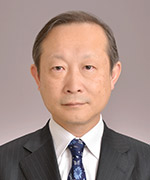Presidential Address

- The 66th Annual Meeting of the Japanese Society for Dialysis Therapy
- President Kazuyoshi Okada
The Assistant Director
Social Medical Corporation, Kawashimakai,
Kawashima Hospital
The 66th Annual Meeting of the Japanese Society for Dialysis Therapy will be held on June 4-6, 2021 at Pacifico Yokohama.
Although Japanese dialysis technology is among the best in the world, how to deal with cardiovascular disease, infection, and malignant tumors is an important question, and as patients become more elderly we are having to face a number of different issues. In particular, the Japanese population is aging faster than anywhere else in the world, and we have a responsibility to spread information on how to deal with these issues to the rest of the world.
The Tokyo Olympics should have been held in summer 2020, but on March 17 the decision was made to postpone them due to the global novel coronavirus (Covid-19) pandemic, and they will now open on July 23 and close on August 8, 2021. The Paralympics will also now open on August 24 and close on September 5, 2021. At this point it is unclear when an effective vaccine for Covid-19 will become available, a sufficiently high antibody prevalence rate will be achieved, or an early treatment drug will be approved, but in Japan the state of emergency has been lifted and the national and local governments are gradually restarting socioeconomic activity while monitoring the infection situation. If there are signs that the infection is starting to spread again, they will re-impose requirements as necessary and organize healthcare and testing systems with the goal of building a society in which the “new normal” has become established, and we intend to hold this Annual Meeting with appropriate infection control measures put in place.
Terms such as “shared decision-making,” “advance care planning,” and “conservative kidney management” that have become well known worldwide have had a major effect on the orientation of healthcare and care in Japan.
In 2001, I proposed the concept of “life with dignity” to describe individuals spending their final days in the ways that they prefer, preserving their dignity as a person while their ability to make end-of-life decisions is respected. Terms such as “withholding dialysis” and “withdrawing dialysis” were formerly used, but in 2011 it was pointed out that even if dialysis is not to be started or continued the correct term is actually “Miawase,” as this allows for dialysis to be conducted should the individual change their mind. This temporary approach is different from forgo and this terminology is now widely accepted in Japan. In addition, as the chair of the Committee to Prepare a Proposal for the Shared Decision-Making Process Regarding Initiation and Continuation of Dialysis, in 2020 I described the process whereby dialysis teams should enable patients to live a dignified life that contents them and approach their final days in the way they wish, by engaging in shared decision-making and carrying out sufficient advance care planning in order to respect the patient’s wishes, accompanying their journey while providing information on renal replacement therapy and conservative kidney management in the choice of treatment for end-stage kidney disease, as well as the decision-making process for temporary forgoing dialysis should the patient or their family members make the choice of conservative kidney treatment.
The theme of this Annual Meeting is “Healthcare team power on broad perspective, imagination, and action: Sharing information on high-quality healthcare and care,” and we are planning a large number of sessions composing an appealing main program. Our goal is to take a broad global perspective, survey the current situation from an objective viewpoint and consider new issues, carry out imaginative research to overcome these issues, and share information on the results with others around the world, with the aim of enabling dialysis teams to work together and provide patients with high-quality healthcare and care.
As ethical issues already exist in clinical settings, dialysis teams must build good relationships with patients through communication. However, as very few team members will have received such training, we are planning sessions to improve communication skills. Alongside new discoveries, we also intend to share information on the characteristically Japanese concepts of “life with dignity” and “temporary forgoing dialysis” with our colleagues around the world.
This Annual Meeting will provide a valuable opportunity for discussion among many medical professionals engaged in dialysis medicine, nursing, and long-term care, and our hope is that it will be useful to participants by helping them provide high-quality healthcare and care.
